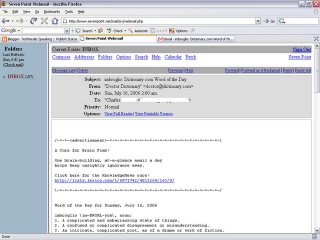Thursday, December 21, 2006
i'm currently reading two books. One is called Human Cloning and Human Dignity. It's a book written by the Presidential Bioethics Committe that George W. Bush appointed. Their basically just talking about cloning and the moral implications. I'm really enjoying it. I'm also reading Brave New World by Aldous Huxley. It's really interesting. I'll talk more about it after I finish reading it. I may do a paper on it; I haven't decided yet on it or East of Eden, which I recently finished.
Books I'm Reading
i'm currently reading two books. One is called Human Cloning and Human Dignity. It's a book written by the Presidential Bioethics Committe that George W. Bush appointed. Their basically just talking about cloning and the moral implications. I'm really enjoying it. I'm also reading Brave New World by Aldous Huxley. It's really interesting. I'll talk more about it after I finish reading it. I may do a paper on it; I haven't decided yet on it or East of Eden, which I recently finished.
New Blogger
Here's my first post using the new Blogger. I'm not sure whether I'll like it more or not, hopefully I will.
Tuesday, December 19, 2006
Democracy in America Paper
Here's a paper that I'm turning in today for my Govt. and Economics class on Democracy in America.
Hailed by scholars as the greatest critique of American government and democracy, Democracy in America by Alexis de Tocqueville dissects the basic elements of American government and gives the reader his conservative opinions on them. Most of the book is a praise of the democratic system and the United States’ implementation of it, but he is an outspoken critic of what he calls the “tyranny of the majority.” This unlimited power of the majority that Tocqueville loathes so much is actually very much the fuel of American democracy.
Alexis de Tocqueville begins Chapter XV by comparing the preponderance of the population in America to the French monarchy. He states that “the interest of the many are to be preferred to those of the few.” But what Tocqueville does not understand is that this method of governing is what democracy is all about. According to the democratic form of government, power should be in the hands of the people. The basis for democracy is equality. If a nation believes in this homogeneity of mankind, then every person has an equal voice in his government; therefore, no man should be given an advantage over another. So, for instance, if in a group of three men, two vote for something while only one votes against it, the two that voted for it win. This is because all three of the men are equal; so, since the one man is not more powerful than the other two, he loses. It is more common sense than philosophical reasoning that rules in favor of the two men. It is the presence of this type of majority in America that Tocqueville so strongly dislikes. America’s legacy as the common man’s land is based on the fact that the common man, the majority, plays a vital role in his government. This concept plays a vital role throughout Chapter XV.
Tocqueville uses two men as an analogy in an attempt to prove that the power of the majority is tyrannical. He says that the more powerful man, the majority, submits his will over the weaker man, making the stronger man a master over a slave. Tocqueville states that this unjust since the stronger man is exploiting the other man’s weakness. But what Tocqueville fails to understand is that power in strength is totally different than power in a majority. A nation is not merely made up of two equal sides with one having domination over another. There is always a majority and always a minority. The majority should almost always have control simply because more people wish for the majority to rule than the minority. In the case of Tocqueville’s analogy, the exploitation that occurs is clearly unfair. But when dealing with a majority, one must recognize that, providing everyone is equal, it is only just that the majority prevails over a minority. Going back to the example given in the previous paragraph, two men have the advantage over one simply because they exercise a fair majority. Why would the will of one ever be taken over the will of two men? This is the essence of democracy - equality and power of the common man.
In another example given by Tocqueville, a mob attacks a newspaper’s headquarters, destroying the press and injuring the editor. Tocqueville declares the mob, in this case the majority, never fails to stamp out any opposition. But again, he uses a faulty example. This fiery mob is not a majority, but a minority. If it were a majority, then the “tyrannical” majority-ruled government could have taken over the press without damage or injury. The majority would have no reason to create a mob.
In Section 4 of Chapter XV, Tocqueville says, “I know of no country in which there is so little independence of mind and real freedom of discussion as in America.” He says that this is because he believes that the majority supposably quells any thought independent of the majority’s dogma. But in a real democratic system, any individual thinking is accepted and even encouraged. Perhaps Tocqueville was reminiscing on the French Republic, which was not a true democracy. America, though, is the land of the free. We have the right of independent thought and opinion guaranteed to us.
According to Alexis de Tocqueville, this repression hinders free thought in writing. A repercussion, Tocqueville states that, as of 1835, there have been no international works or writers that have come out of America. He says that the inability to think freely is what holds back potential great American writers. Tocqueville believes that if a great literary work is released that is contrary to popular opinion, then the author of the work is ostracized and discouraged from writing any more works of the same type. This brings out an important footnote that is important to consider. Many of Tocqueville’s speculations have been rendered invalid since the time of the book’s first publishing. For instance, in this case there have been many international acclaimed writers since Tocqueville’s lifetime. As a matter of fact, a large part of the 20th centuries writers were American.
Tocqueville goes on and says that perhaps the greatest danger in the American democratic system is the mutability of our laws. He states that our living constitution is threatening because it can be easily altered by the whims of the majority. He believes that if the majority sees something in the constitution that they don’t like, they can simply wave a wand and make it disappear. Tocqueville fails to grasp three vital concepts. First of all, a living constitution is one of America’s greatest achievements. One that can be changed to suit the needs of the current age. If our constitution is immutable, blacks would still be slaves and women wouldn’t be able to vote. Second of all, the majority should be able to change the constitution if they feel that it is necessary. For instance, if the majority of Americans are in favor of enacting a new law that creates juvenile curfews, then common sense dictates that the law be passed. And lastly, the constitution is written so that laws cannot be created simply by sudden impulses. It is a long process, taking time so the people can fully decide if it is actually a good law. These three arguments clearly rule out Tocqueville’s reasoning that a living constitution is a faulty one.
In a chapter filled with ideas contrary to the democratic way, Democracy in America does make a good point at the end of the chapter. Alexis de Tocqueville points out that the majority often gets caught in self-applause. The majority often congratulates itself, never studying its own downfalls and shortcomings. The public often thinks that they have everything all figured out, relaxing and letting their senators do their work. This is one of democracy’s few shortcomings, a flaw worth noting but not critical enough to be fatal.
While the premise that this essay is founded on is that the majority should have absolute control, there is one crucial exception that should be noted. If the majority steps out of the natural moral boundaries laid down by God, hen any possible altering of the constitution should be rendered null and void. The law of reason makes anything immoral a violation; so if anyone, majority or minority, tries to enforce it, they are awry and should be prohibited from imposing their will on the moral minority.
For the most part, Democracy in America praises American democracy, applauding its Biblical basis and moral practicality. But in Section XV, Alexis de Tocqueville challenges the “tyranny of the majority,” declaring it to be unfounded and destructive. But what he fails to understand is that that is what democracy is about. The power of the common man and reigns of the government in the majority’s hands is the essence of democracy.
Hailed by scholars as the greatest critique of American government and democracy, Democracy in America by Alexis de Tocqueville dissects the basic elements of American government and gives the reader his conservative opinions on them. Most of the book is a praise of the democratic system and the United States’ implementation of it, but he is an outspoken critic of what he calls the “tyranny of the majority.” This unlimited power of the majority that Tocqueville loathes so much is actually very much the fuel of American democracy.
Alexis de Tocqueville begins Chapter XV by comparing the preponderance of the population in America to the French monarchy. He states that “the interest of the many are to be preferred to those of the few.” But what Tocqueville does not understand is that this method of governing is what democracy is all about. According to the democratic form of government, power should be in the hands of the people. The basis for democracy is equality. If a nation believes in this homogeneity of mankind, then every person has an equal voice in his government; therefore, no man should be given an advantage over another. So, for instance, if in a group of three men, two vote for something while only one votes against it, the two that voted for it win. This is because all three of the men are equal; so, since the one man is not more powerful than the other two, he loses. It is more common sense than philosophical reasoning that rules in favor of the two men. It is the presence of this type of majority in America that Tocqueville so strongly dislikes. America’s legacy as the common man’s land is based on the fact that the common man, the majority, plays a vital role in his government. This concept plays a vital role throughout Chapter XV.
Tocqueville uses two men as an analogy in an attempt to prove that the power of the majority is tyrannical. He says that the more powerful man, the majority, submits his will over the weaker man, making the stronger man a master over a slave. Tocqueville states that this unjust since the stronger man is exploiting the other man’s weakness. But what Tocqueville fails to understand is that power in strength is totally different than power in a majority. A nation is not merely made up of two equal sides with one having domination over another. There is always a majority and always a minority. The majority should almost always have control simply because more people wish for the majority to rule than the minority. In the case of Tocqueville’s analogy, the exploitation that occurs is clearly unfair. But when dealing with a majority, one must recognize that, providing everyone is equal, it is only just that the majority prevails over a minority. Going back to the example given in the previous paragraph, two men have the advantage over one simply because they exercise a fair majority. Why would the will of one ever be taken over the will of two men? This is the essence of democracy - equality and power of the common man.
In another example given by Tocqueville, a mob attacks a newspaper’s headquarters, destroying the press and injuring the editor. Tocqueville declares the mob, in this case the majority, never fails to stamp out any opposition. But again, he uses a faulty example. This fiery mob is not a majority, but a minority. If it were a majority, then the “tyrannical” majority-ruled government could have taken over the press without damage or injury. The majority would have no reason to create a mob.
In Section 4 of Chapter XV, Tocqueville says, “I know of no country in which there is so little independence of mind and real freedom of discussion as in America.” He says that this is because he believes that the majority supposably quells any thought independent of the majority’s dogma. But in a real democratic system, any individual thinking is accepted and even encouraged. Perhaps Tocqueville was reminiscing on the French Republic, which was not a true democracy. America, though, is the land of the free. We have the right of independent thought and opinion guaranteed to us.
According to Alexis de Tocqueville, this repression hinders free thought in writing. A repercussion, Tocqueville states that, as of 1835, there have been no international works or writers that have come out of America. He says that the inability to think freely is what holds back potential great American writers. Tocqueville believes that if a great literary work is released that is contrary to popular opinion, then the author of the work is ostracized and discouraged from writing any more works of the same type. This brings out an important footnote that is important to consider. Many of Tocqueville’s speculations have been rendered invalid since the time of the book’s first publishing. For instance, in this case there have been many international acclaimed writers since Tocqueville’s lifetime. As a matter of fact, a large part of the 20th centuries writers were American.
Tocqueville goes on and says that perhaps the greatest danger in the American democratic system is the mutability of our laws. He states that our living constitution is threatening because it can be easily altered by the whims of the majority. He believes that if the majority sees something in the constitution that they don’t like, they can simply wave a wand and make it disappear. Tocqueville fails to grasp three vital concepts. First of all, a living constitution is one of America’s greatest achievements. One that can be changed to suit the needs of the current age. If our constitution is immutable, blacks would still be slaves and women wouldn’t be able to vote. Second of all, the majority should be able to change the constitution if they feel that it is necessary. For instance, if the majority of Americans are in favor of enacting a new law that creates juvenile curfews, then common sense dictates that the law be passed. And lastly, the constitution is written so that laws cannot be created simply by sudden impulses. It is a long process, taking time so the people can fully decide if it is actually a good law. These three arguments clearly rule out Tocqueville’s reasoning that a living constitution is a faulty one.
In a chapter filled with ideas contrary to the democratic way, Democracy in America does make a good point at the end of the chapter. Alexis de Tocqueville points out that the majority often gets caught in self-applause. The majority often congratulates itself, never studying its own downfalls and shortcomings. The public often thinks that they have everything all figured out, relaxing and letting their senators do their work. This is one of democracy’s few shortcomings, a flaw worth noting but not critical enough to be fatal.
While the premise that this essay is founded on is that the majority should have absolute control, there is one crucial exception that should be noted. If the majority steps out of the natural moral boundaries laid down by God, hen any possible altering of the constitution should be rendered null and void. The law of reason makes anything immoral a violation; so if anyone, majority or minority, tries to enforce it, they are awry and should be prohibited from imposing their will on the moral minority.
For the most part, Democracy in America praises American democracy, applauding its Biblical basis and moral practicality. But in Section XV, Alexis de Tocqueville challenges the “tyranny of the majority,” declaring it to be unfounded and destructive. But what he fails to understand is that that is what democracy is about. The power of the common man and reigns of the government in the majority’s hands is the essence of democracy.
Saturday, December 16, 2006
A looking at the upcoming Mac OSX Leopard
Slated to be released early 1Q 2007, Apple's newest operating system is self-labeled as Vista 2.0. But from what I can tell, there are arn't that many new features than OXS Tiger. Time Machine, Spaces, and better collaboration withiniLife seems to be the only thing really standing out for Leopard. Expected to be released for about $150, I'm still undecided whether I'll purchase of it immediately or not. Here's a link for it here: http://www.apple.com/macosx/leopard/index.html
Friday, December 15, 2006
It's that time of year! Midterms, studying, and more studying. I took my first final yesterday and finish them next tuesday. I'm looking foward to late nights of studying.
I just a widget for posting so I'll try to do this more.
I just a widget for posting so I'll try to do this more.
Thursday, July 20, 2006
MercyMe's Blog
I recently found MercyMe's blog. It isn't updated a lot but it's still fun to check on every now and then to see what my favorite band is up to. By the way, the reason I'm posting so much is because I recently downloaded Google's Blog Comments. If you have this Firefox extension, whenever you load a web page, it shows some comments bloggers made about that site. I'm the first one to comment/post about MercyMe's Blog.
CleanFilms - Rent and Buy Family Edited DVD Movies
While US District Judge Richard P. Matsch has declared edited movies illegitimate, Cleanfilms and other major editing companies effected by the lawsuit are appealing, a process which could take up to a year. That should give them enough time to prepare for a close with minimal deficits. Of course there's always a chance that the appeal will follow through and editing companies will be legalized again. On a different note, Cleanfilms is no longer allowing new members to join. Click on the link to try the free trial , and they state that "Due to recent legal action, we are not accepting new members at this time." It seems that although they are still appealing, editing films in general is illegal and trying to continue with their "illegal practices" would be illegal as well.
I love Google Labs
What Google has going on in Google Labs is just really exciting. Google Labs is, to put it simply, a public showcase of everthing Google is designing that's not ready to go mainstream quite yet. Volunteer beta testers, like myself, will download programs in Google labs, try them out, and send feedback to Google about what we liked about the program and what needs improvement. In Google's own terms, Google Labs is their "technology playground." The 'Labs' product that I'm using the most right now is Google Browser Sync. Since I'm using different computers at home, at work, and anywhere between, I need a portal to centralize all of my internet information; Browser Sync helps me accomplish that. From whatever computer I'm currently on (as long as it has Firefox with Browser Sync downloaded on it), I can transport all of my information from my last use of Firefox to my current visit. Tabs, cookies, bookmarks, and everthing else all come back, even if it's on a computer on the other side of the world. All I have to do is log on. Of course, in beta phase, Google browser sync does have its drawbacks. The biggest one right now is that it takes while to start up. Of course, as Google's working out the kinks of the program right now, so I would expect to see the lag time vanish by the time it goes mainstream. Nevertheless, I still love it as a product, and will always use it.
Sunday, July 16, 2006
Going back to Gmail
About a year back I started using Gmail, Google's e-mail service. Half a year later, I decided to switch to a business e-mail when I started working for HollyGood. Now, aggravated with the business e-mail I'm going back to Gmail. What was so aggravating. Well, you can blame most of it on me, I guess. I'm never working on one single computer, so an internet e-mail system was a must for me. Though both are, the HollyGood interface was horrible. The type was all in that scratchy writing. Below are the pictures of the Gmail interface and the interface from Sevenpoint, the company that hosts our site and e-mail. Both pictures show the same e-mail. As you can see, there's a big difference in... well, everything. The sevenpoint e-mail was just an "imbroglio" (the dictionary.com word of the day). It's just so great to be back to a simple, clean interace and e-mail in general.



























